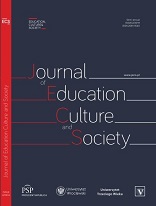Motivation Behind the Preference of Distance Education of Higher Education Students
Motivation Behind the Preference of Distance Education of Higher Education Students
Author(s): Nina Pidbutska, Anastasiia Knysh, Yulia Chebakova, Iryna Shtuchenko, Olena BabchukSubject(s): Social Sciences, Education, Higher Education , Sociology of Education
Published by: Fundacja Pro Scientia Publica
Keywords: online learning;distance education;science motivation;students;personality development;
Summary/Abstract: Aim. The aim of the study is to investigate into the motives of learning that are inherent in students with different attitudes to distance learning. The main objectives of the study are as follows: to analyze the attitude to different forms of distance learning of students of higher education institutions; to investigate the main forms of scientific motivation of students of higher education institutions; to compare how the scientific motivation of students with different attitudes to distance learning differs. Methods. The study involved 211 students majoring in science (physics, chemistry). The study uses the following methods: 1) attitude questionnaire; 2) Science Motivation Questionnaire II; 3) statistical methods. The following is used for statistical data processing: descriptive statistics methods (to measure the percentage of people with different attitude towards organization of distance learning); ANOVA (to compare levels of science motivational types of students with different preferences in educational models). Results. It was determined that 38% of students are positive about distance education and see great opportunities for its implementation. But only 22.75% of students consider distance learning the best option of educational process organisation, and 21.8% are in favor of an exclusive face-to-face format. The most popular form among students is mixed form of education (55.45%). Students with a positive attitude to distance education are characterized by the highest scores on intrinsic motivation, self-efficacy and career motivation. Therefore, proponents of distance education are mostly students who have a good understanding of their own goals and learning needs, plan their career advancement, and are well-organized in terms of educational and professional development. Conclusions. Distance forms of education cannot completely replace traditional ones. But it is already becoming obvious that their use in a mixed format can increase the effectiveness of the educational process. Students' sympathy for the mixed format should be taken into account by the developers of educational programs and university administrations in order to improve the quality of education and meet the requirements of the times.
Journal: The Journal of Education, Culture, and Society
- Issue Year: 13/2022
- Issue No: 1
- Page Range: 201-210
- Page Count: 10
- Language: English

